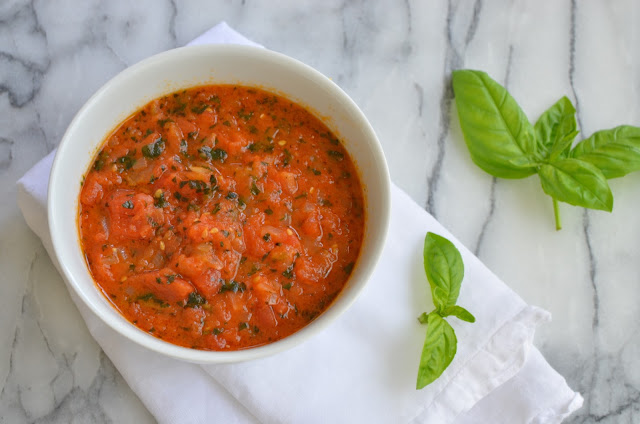Please visit our new website (www.smellofrosemary.com) for this recipe:
Pesto is an aromatic herb mixture; often used as a simple sauce
for pasta, a spread for sandwiches or Panino, as a flavor punch to soups, as a stuffing for vegetables and to improve taste of roasted meat. The possibilities to use
this wonderful dish are practically endless.
I would like to start with the simplest and probably the most
popular of pestos: basil pesto.
Like all pestos, this recipe is a combination of fragrant fresh
blanched herbs, garlic (often roasted or toasted to improve the taste, raw
garlic is too harsh for this dish), oil, and cheese. You can also add pine
nuts, or almonds. Because of nut allergies in my family, I always avoid tree nuts,
but use it and it will improve your pesto.
Ingredients
3 cups of
packed fresh basil leaves
2
tablespoons toasted garlic
1/3 cup extra
virgin olive oil
1/3 cup parmesan
cheese
3
tablespoons of pine nuts (if desired)
Salt and pepper
It is good to blanch basil before processing; it will ensure
the nice, bright green color of the pesto. To blanch basil (or any other herb) you will
need a pot of boiling water; plunge the basil in the boiling water for 4 to 5 seconds, and immediately
remove and plunge in an ice water bath. This will stop basil from further cooking. Dry basil between sheets of paper towel, remove as much water as possible.
So,
when you have your blanched basil, and lightly toasted the garlic (peel and slice
garlic, and toast it in a medium-high pre-heated pan, lightly covered with olive oil, for 2 to 3
minutes, or until golden brown), place all ingredients in a blender, except
cheese (basil, garlic, olive oil),and process until smooth. (At this point, you can freeze pesto, if you make a big batch of it, it will stay good for three months. Mix in parmesan cheese after defrosting).
Remove basil mixture and mix in parmesan
cheese.
Add
salt and pepper to taste. Pesto will stay fresh in the refrigerator for up to five days.
This recipe is inspired by a recipe found in Cooking One On One by John Ash.
